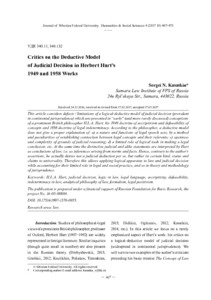Показать сокращенную информацию
Critics on the Deductive Model of Judicial Decision in Herbert Hart’s 1949 and 1958 Works
| Автор | Kasatkin, Sergei N. | en |
| Автор | Касаткин, С.Н. | ru_RU |
| Дата внесения | 2017-04-28T02:56:13Z | |
| Дата, когда ресурс стал доступен | 2017-04-28T02:56:13Z | |
| Дата публикации | 2017-04 | |
| URI (для ссылок/цитирований) | https://elib.sfu-kras.ru/handle/2311/32332 | |
| Аннотация | This article considers defects / limitations of a logical-deductive model of judicial decision (prevalent in continental jurisprudence) which are presented in “early” (and more rarely discussed) conceptions of a prominent British philosopher H.L.A. Hart: his 1949 doctrine of ascriptivism and defeasibility of concepts and 1958 doctrine of legal indeterminacy. According to the philosopher, a deductive model does not give a proper explanation of: a) a nature and functions of legal speech acts; b) a method and peculiarities of establishing connection between legal concepts and their referents; c) openness and complexity of grounds of judicial reasoning; d) a limited role of logical tools in making a legal conclusion; etc. At the same time the distinctive judicial and alike statements are interpreted by Hart as conclusions of law, i.e. as inferences arising from norms and facts. Hence, contrary to the author’s assertions, he actually denies not a judicial deduction per se, but rather its certain kind, status and claims to universality. Therefore this allows applying logical apparatus to law and judicial decision while accounting for their limited role in legal and social practice, and so in theory and methodology of jurisprudence | en |
| Аннотация | В статье обсуждаются дефекты/ограничения (распространенной в континентальной юри- спруденции) логико-дедуктивной модели решения, представленные в «ранних» (и реже об- суждаемых) концепциях известного британского философа Г.Л.А. Харта: в его доктрине аскриптивизма и отменяемости понятий 1949 года и доктрине правовой неопределенности 1958 года. Согласно философу, логико-дедуктивная модель не дает надлежащего объяснения: а) характера и функций правовых речевых актов; б) способа и особенностей установления связи правовых понятий и их референтов; в) открытости и сложности оснований судебной аргументации; г) ограниченной роли логических средств в производстве юридического вывода; и т.п. Вместе с тем характерные судебные и близкие им высказывания трактуются Хартом именно в качестве юридических выводов, т.е. заключений, проистекающих из норм и фактов. Отсюда, вопреки заявлениям автора, он, по сути, отрицает не судебную дедукцию как та- ковую, но скорее определенный ее вид, статус и претензии на универсальность. Это, в свою очередь, допускает применение к праву и судебному решению аппарата логики при понимании их ограниченной роли в юридической и социальной практике, в теории и методологии юриспру- денции | ru_RU |
| Язык | en | en |
| Издатель | Сибирский федеральный университет. Siberian Federal University | en |
| Тема | H.L.A. Hart | en |
| Тема | judicial decision | en |
| Тема | logic in law | en |
| Тема | legal language | en |
| Тема | ascriptivity | en |
| Тема | defeasibility | en |
| Тема | indeterminacy in law | en |
| Тема | analytical philosophy of law | en |
| Тема | formalism | en |
| Тема | legal positivism | en |
| Тема | Г.Л.А. Харт | ru_RU |
| Тема | судебное решение | ru_RU |
| Тема | логика в праве | ru_RU |
| Тема | юридический язык | ru_RU |
| Тема | аскриптивность | ru_RU |
| Тема | отменяемость | ru_RU |
| Тема | неопределенность в праве | ru_RU |
| Тема | аналитическая философия права | ru_RU |
| Тема | формализм | ru_RU |
| Тема | юридический позитивизм | ru_RU |
| Название | Critics on the Deductive Model of Judicial Decision in Herbert Hart’s 1949 and 1958 Works | en |
| Альтернативное название | Критика дедуктивной модели судебного решения в работах Герберта Харта 1949 и 1958 гг. | ru_RU |
| Тип | Journal Article | |
| Тип | Published Journal Article | |
| Контакты автора | Kasatkin, Sergei N.: Samara Law Institute of FPS of Russia 24в Ryl’skaya Str., Samara, 443022, Russia; kasatka_s@bk.ru | en |
| Контакты автора | Касаткин, С.Н.: Самарский юридический институт ФСИН России Россия, 443022, Самара, ул. Рыльская, 24в | ru_RU |
| Страницы | 467-473 | ru_RU |
| Журнал | Журнал Сибирского федерального университета. Гуманитарные науки. Journal of Siberian Federal University. Humanities & Social Sciences;2017 10 (4) | en |

